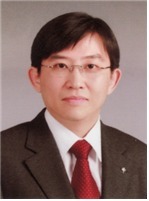people

Professor Sang Ouk Kim
Sang Ouk Kim, a professor of Materials Science and Engineering at KAIST, received the 2014 Prime Minister Award from the Korean government for his nano research. The award ceremony, Nano Korea 2014, was held on July 2, 2014 at Coex in Seoul, Korea.
Professor Kim was recognized for his research on the control of various shapes of ultra-fine nano-structures using molecular assembly with ductile materials, such as polymers and carbon nano materials, and for his contribution to the growth of the nano field in Korea.
He developed a new molecular assembly control technology, for the first time in the world, which produced large-scale, ultra-fine nanopatterns through controlling the molecular arrangement of block copolymers. Using this technology, he further created a new semiconductor nanotechnology to reinforce the existing lithographic process of semiconductor manufacturing.
In addition, Professor Kim has focused on making a new type of three-dimensional carbon nano-materials by assembling carbon nanotubes or graphene at the molecular level. Developing a new process to produce nano-materials through the chemical doping process of carbon materials, which can be widely applied to solar cells or energy devices, is one of his research interests as well.
Professor Kim has published a total of 124 papers in international journals, such as Nature, Science, Nature Materials, Nature Communications, Advanced Materials, and Nano Letters. He was recently invited by Advanced Materials to contribute a review article for its 25th anniversary issue.
Professor Kim received both the KAIST Academic Award and the 13th Young Scientist Award of Korea in 2010. Since March 2014, he has served as one of the chair professors of KAIST.
Most recently, he was selected as the Scientist of the Month in June 2014 by the Ministry of Science, ICT and Future Planning, Republic of Korea, and the National Research Foundation of Korea.
-
people Distinguished Professor Sang Yup Lee Wins 2025 Global Metabolic Engineering Award
< Distinguished Professor Sang Yup Lee (Senior Vice President for Research) from the Department of Chemical & Biomolecular Engineering > KAIST announced on the 20th that Professor Sang Yup Lee, who serves as the Vice President for Research and a Distinguished Professor at our university, has been awarded the '2025 Gregory N. Stephanopoulos Award for Metabolic Engineering' by the International Metabolic Engineering Society (IMES). Professor Lee delivered his award lecture at the 16
2025-06-20 -
research KAIST Professor Jee-Hwan Ryu Receives Global IEEE Robotics Journal Best Paper Award
- Professor Jee-Hwan Ryu of Civil and Environmental Engineering receives the Best Paper Award from the Institute of Electrical and Electronics Engineers (IEEE) Robotics Journal, officially presented at ICRA, a world-renowned robotics conference. - This is the highest level of international recognition, awarded to only the top 5 papers out of approximately 1,500 published in 2024. - Securing a new working channel technology for soft growing robots expands the practicality and application possib
2025-06-09 -
research KAIST & CMU Unveils Amuse, a Songwriting AI-Collaborator to Help Create Music
Wouldn't it be great if music creators had someone to brainstorm with, help them when they're stuck, and explore different musical directions together? Researchers of KAIST and Carnegie Mellon University (CMU) have developed AI technology similar to a fellow songwriter who helps create music. KAIST (President Kwang-Hyung Lee) has developed an AI-based music creation support system, Amuse, by a research team led by Professor Sung-Ju Lee of the School of Electrical Engineering in collaboration
2025-05-07 -
event KAIST Alumni Association to Honor Alumni of the Year Award Winners
Photo 1. Photo of the KAIST Alumni of the Year Award Recipients (From left) UST President Lee-whan Kim, CEO Han Chung of iThree Systems Co., Ltd., CEO Dong Myung Kim of LG Energy Solution Co., Ltd., and Professor Hyun Myung of the School of Electrical Engineering at KAIST KAIST (President Kwang Hyung Lee) announced on Monday, the 13th of January that the Alumni Association (President Yun-Tae Lee) has selected its Alumni of the Year. This year’s honorees are: ▴ President Lee-whan K
2025-01-15 -
event KAIST Wins CES 2025 Innovation Award, Showcasing Innovative Technologies
KAIST will showcase innovative technologies at the world’s largest technology fair, the Consumer Electronics Show (CES 2025). In addition, KAIST startups VIRNECT Inc., Standard Energy Inc., A2US Inc., and Panmnesia, Inc. won the 2025 CES Innovation Awards. < Image 1. 3D-Graphical Profile of CES 2025 KAIST Exhibition Booth > KAIST (President Kwang-Hyung Lee) announced on the 31st that it will operate a 140㎡ standalone booth at CES Eureka Park, which will be held in Las Vegas,
2024-12-31